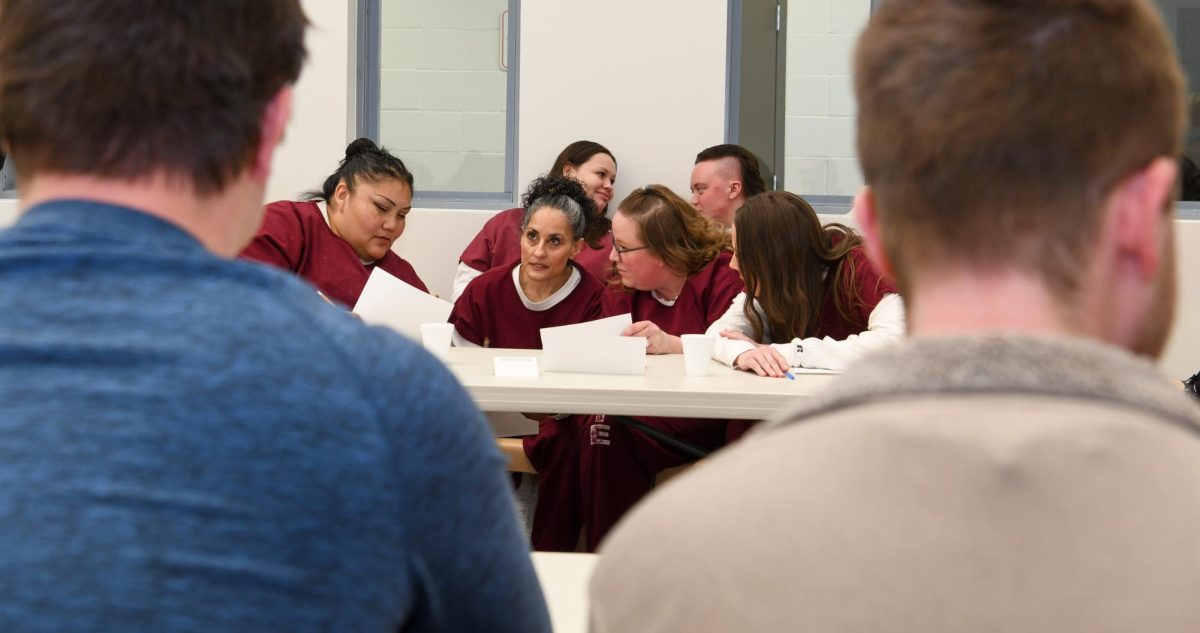The United States system of mass incarceration and profitable punishment is far from being a system of justice. Utah must make prison conditions more humane by collaborating with those who have been affected. Increasing access to education within prisons can help improve conditions for incarcerated people while affording them more future opportunities. H.B. 278 and S.B. 78, if passed, will do this.
Utah Prisons
Access to education is particularly essential in prisons and jails, where people are stripped of many rights. When Utah’s $1.05 billion new prison opened in 2022, Gov. Cox expressed his hopes that it would be a place for new beginnings. But Utah prison conditions have only gotten more unfavorable — dangerously understaffed, health concerns due to mosquitoes and problems accessing medication all on the non-exhaustive list.
The prison system is inherently racist and Utah’s system is no different. The state inequitably incarcerates BIPOC people, LGBTQ+ people and people with disabilities. And states put a minuscule number of transgender people in prisons that match their lived gender. This is not only an affront to trans people but is also dangerous as queer people in prison are sexually victimized at high rates. Those whose marginalized identities intersect, like Black trans women, face a higher chance of being imprisoned, in worse conditions, when incarcerated.
Incarceration is inherently detrimental to mental health — suicide is the leading cause of death in jails. Furthermore, being incarcerated comes with steep costs for incarcerated people and their families.
With such inhumane conditions, the fact that Utah incarceration rates are surging, especially in women’s prisons, is even more dire.
On top of this, “Approximately 70% of people at the time of their arrest don’t have a secondary credential, meaning a high school diploma or a GED,” said Erin Castro, who co-founded the University of Utah Prison Education Project.
Education in Prison
Like UPEP, Utah Tech University’s Higher Education for Incarcerated Youth program provides free education for incarcerated people, in this case, those under 21. S.B. 78 specifically addresses HEIY. The bill aims to expand who the program can reach, which is a needed change.
Nathan Caplan, director of HEIY, said that “only 1 in 100 formerly incarcerated youth will graduate from college by the age of 25.”
Sen. Riebe, the bill’s sponsor, wanted the program to include people under house arrest. If it passes, those students can receive up to a bachelor’s degree via online classes. This program “has the ability to change people’s lives by getting some education under their belt,” said Riebe. Post-release, prison education increases employment opportunities and lowers recidivism rates.
This is important because “coming out of prison being successful is an almost impossible feat,” Castro said. Systemic disenfranchisement of people with criminal records renders finding housing, employment and education difficult, she explained.
Another bill introduced this session would establish necessary changes for prison education. H.B. 278, sponsored by Rep. Ballard, determines incarcerated people as in-state residents for tuition and allows for scholarships. It would also assign academic and career advisors to these students. Advisors can help students apply for scholarships and classes, write resumes and plan their futures.
“We want to be part of the solution and help them to be able to take that ownership and to help themselves, and to have the courage and the skills to be able to do that,” Ballard said.
Outside of programs like UPEP and HEIY, students in prison attending classes through local institutions must pay 50% of tuition upfront. Ballard said that failure to pay results in being sent to collections after being released from prison. Her legislation would help by reducing tuition costs through scholarships. Still, even in-state tuition with scholarships can be pricey.
Ballard also is sponsoring H.B. 248, Inmate Amendments, whose second substitute includes the entirety of H.B. 278. Among other amendments, it would create a re-entry division and require the Department of Corrections to determine estimated release dates. This would be a step up from the indeterminate sentencing currently in place, which can release people “at whatever time of day with no money in their pocket and no plan,” Ballard said.
Beyond The Bills
Several barriers to prison education still exist.
Ballard sponsored a bill in 2022 addressing gender equality in prison education programs. It required that incarcerated women receive the same educational opportunities as men.
Despite this, “Our students on the women’s designated side continue to be disappointed and frustrated that there’s not more opportunity for programming,” Castro said. Most prison education programs across the U.S. serve people in men’s facilities.
And while the new Utah prison claims to have increased space for education, this isn’t true for the women’s designated side. Andy Eisen, director of UPEP, confirmed this and added that the prison doesn’t provide space for a designated classroom or computer lab.
Youth and adults in the prison system engaging in education also need more funding for technology. This includes secure computers and secure software for learning. “It’s a cost that we hope the state legislature can help us with, or even donors because that facilitates youth participation in higher education,” Caplan said.
Utahns should also be aware that seemingly unrelated bills this legislative session will affect prisons, too. For one, the removal of diversity, equity and inclusion will only make education less accessible for BIPOC people, increasing the racial gap in the prison system.
S.B. 78 and H.B. 248, which includes H.B. 278, wouldn’t solve all these problems. But they would help increase access to prison education, improving the quality of life for incarcerated people before and after their release.
“Incarcerated people are our community. We have a responsibility to do [prison education] in our state,” said Castro. “It should be in our collective interest.”
Utahns must acknowledge that prison reform will never be enough while simultaneously advocating for legislation that makes prisons more humane. Increasing access to prison education is a vital step.













